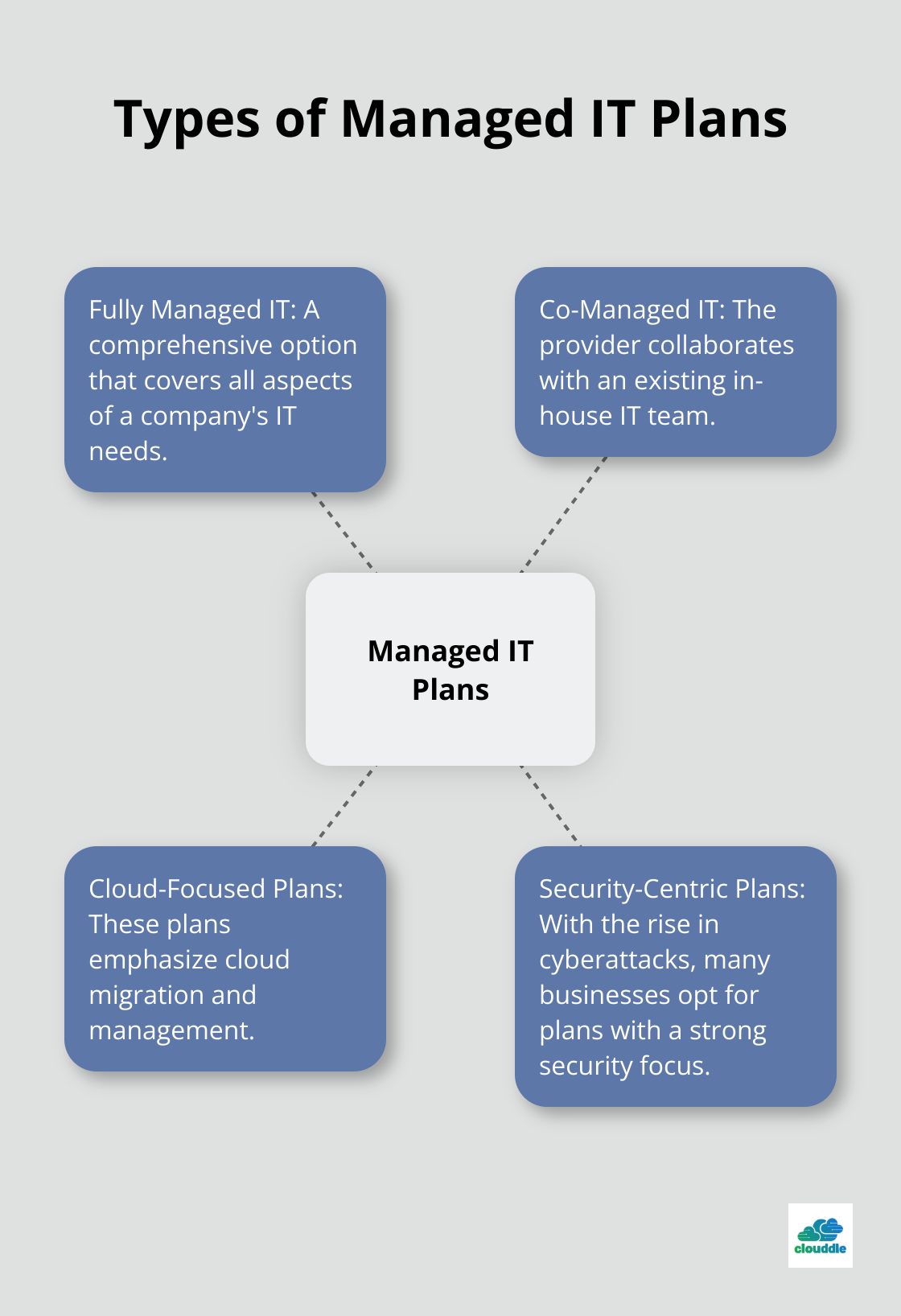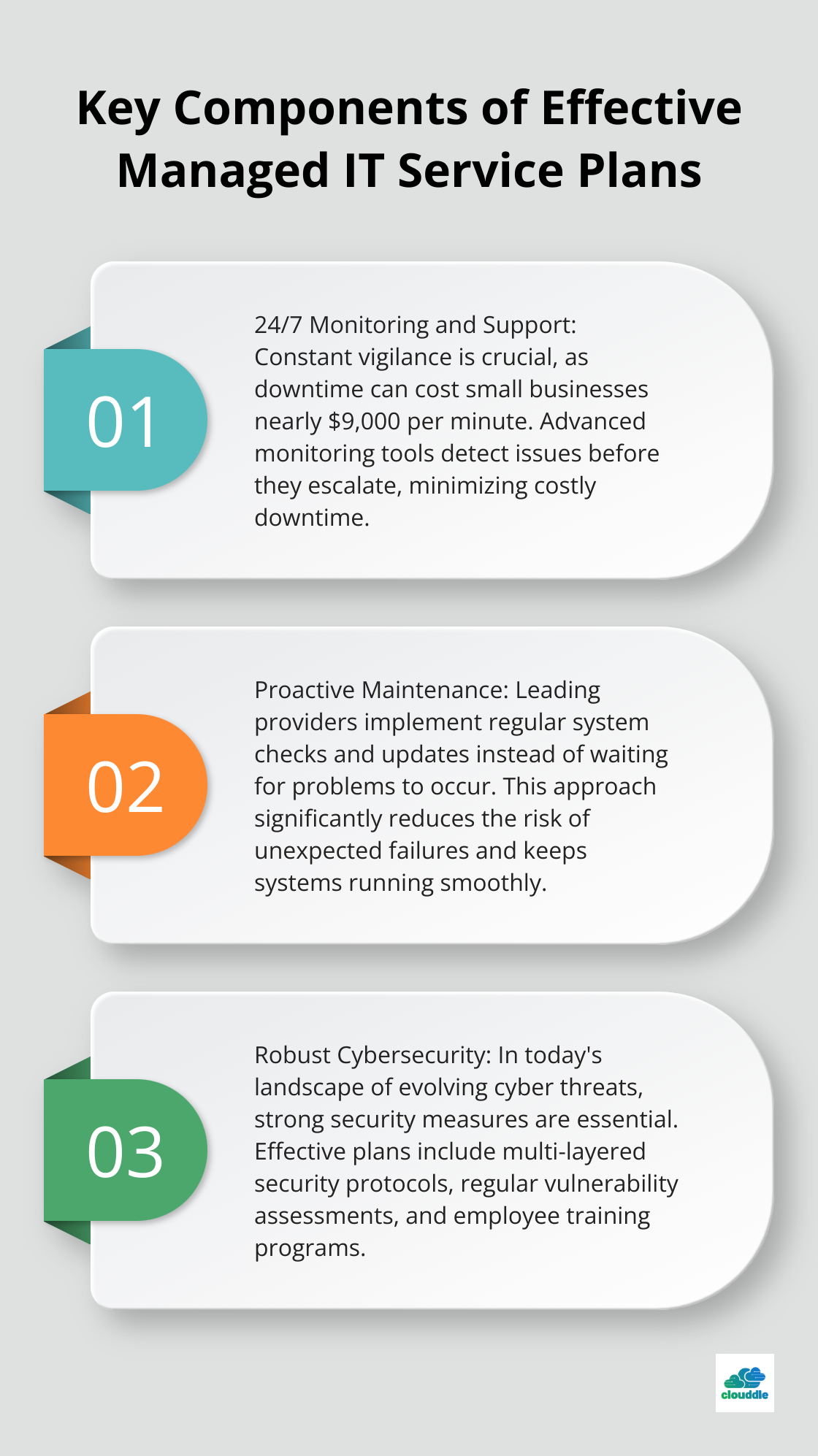In today’s fast-paced digital landscape, businesses face increasing IT challenges. Managed IT service plans offer a solution, providing comprehensive support and expertise.
At Clouddle, we’ve seen firsthand how the right IT management can transform operations and boost productivity.
This guide will help you navigate the world of managed IT services, ensuring you choose a plan that aligns with your business needs and goals.
What Are Managed IT Service Plans?
The Essence of Managed IT Services
Managed IT services refer to technology-focused tasks and services outsourced to a third-party vendor, or managed service provider (MSP). These services involve a third-party provider taking charge of a company’s IT infrastructure, covering aspects from network management and cybersecurity to cloud services and tech support.
Types of Managed IT Plans
Businesses have diverse needs, and managed IT plans reflect this variety:
- Fully Managed IT: A comprehensive option that covers all aspects of a company’s IT needs.
- Co-Managed IT: The provider collaborates with an existing in-house IT team.
- Cloud-Focused Plans: These plans emphasize cloud migration and management.
- Security-Centric Plans: With the rise in cyberattacks, many businesses opt for plans with a strong security focus.

Benefits of Outsourcing IT Management
Outsourcing IT management offers numerous advantages. Here’s why:
- Cost Efficiency: Managed services can potentially reduce IT costs.
- Access to Expertise: Businesses gain a team of specialists without extensive in-house hiring.
- Improved Security: Managed services provide up-to-date protection against rapidly evolving cyber threats.
- Scalability: IT services can easily scale to match business growth.
Industry-Specific Solutions
Different industries require tailored IT solutions. For example, hospitality businesses often need robust Wi-Fi and guest management systems, while senior living facilities might prioritize secure patient data management and communication systems. Clouddle specializes in providing customized managed IT services for these sectors, ensuring that each client receives a solution that fits their unique needs.
The Future of Managed IT Services
The managed IT services market continues to evolve. Trends include increased focus on AI and machine learning, enhanced cybersecurity measures, and more comprehensive cloud integration. As businesses become more reliant on technology, the role of managed IT services in ensuring smooth operations and driving innovation will only grow.
The next section will explore the key components that make an effective managed IT service plan, helping you understand what to look for when choosing a provider.
What Makes an Effective Managed IT Service Plan?
Round-the-Clock Vigilance
24/7 monitoring and support forms the foundation of modern business operations. A report from Ponemon Institute in 2016 suggests that downtime costs average nearly $9,000 per minute for small businesses, highlighting the need for constant vigilance. Top-tier managed IT services use advanced monitoring tools to detect issues before they escalate, which minimizes downtime and its associated costs.

Proactive Maintenance
Effective IT management centers on proactive maintenance and updates. Leading providers implement regular system checks and updates instead of waiting for problems to occur. This approach reduces the risk of unexpected failures.
Robust Cybersecurity
In today’s landscape of evolving cyber threats, strong cybersecurity and data protection measures are essential. Effective managed IT plans include multi-layered security protocols, regular vulnerability assessments, and employee training programs to create a human firewall against potential threats.
Cloud Integration
Cloud services and data backup solutions play a vital role in business continuity. Managed IT providers should offer seamless cloud integration, which ensures data accessibility, scalability, and disaster recovery capabilities. Regular backups (ideally following the 3-2-1 rule: 3 copies, 2 different media, 1 off-site) are essential for data protection.
Network Optimization
Network management and optimization are critical for maintaining peak performance. Effective managed IT plans include regular network assessments, bandwidth optimization, and traffic prioritization. These measures can improve network performance.
The most effective managed IT service plans offer a holistic approach to technology management. They combine proactive monitoring, robust security measures, cloud integration, and network optimization to create a resilient and efficient IT infrastructure. As we move forward, it’s important to consider the factors that will help you choose the right managed IT service provider for your business needs.
How to Choose the Right Managed IT Service Provider
Selecting the ideal managed IT service provider is a critical decision that can significantly impact your business operations. To make an informed choice, consider these key factors:

Industry-Specific Expertise
Look for a provider with proven experience in your industry. If you operate in the hospitality sector, seek out an MSP that understands the unique challenges of managing guest Wi-Fi networks and property management systems. Ask potential providers for case studies or client references within your industry. This approach ensures they’re familiar with your specific regulatory requirements and can offer tailored solutions.
Service Level Agreements
Review the Service Level Agreements (SLAs) offered by potential providers carefully. These documents outline the expected performance levels, response times, and resolution timeframes for various issues. Pay close attention to uptime guarantees, which should be at least 99.9% for critical systems. Also, check for penalties if the provider fails to meet these agreed-upon standards. A well-structured SLA protects your business interests and sets clear expectations for service quality.
Scalability and Future-Proofing
Your chosen MSP should grow with your business. Assess their ability to scale services up or down based on your changing needs. Ask about their process for adding new users, locations, or services to your plan. Additionally, inquire about their approach to emerging technologies like AI and machine learning. A forward-thinking provider will help future-proof your IT infrastructure, ensuring you stay competitive in a rapidly evolving digital landscape.
Transparent Pricing
Understanding the cost structure is essential for budgeting and avoiding unexpected expenses. Some providers offer tiered pricing models, while others use a per-user or per-device approach. Ask for a detailed breakdown of what’s included in each pricing tier and be wary of hidden fees or charges for additional services.
Support and Communication
Effective communication forms the cornerstone of a successful managed IT service relationship. Evaluate the provider’s support channels and response times. Do they offer 24/7 support? What’s their average resolution time for critical issues? This improvement often stems from responsive support and clear communication.
Final Thoughts
Managed IT service plans have become essential for businesses in the complex digital landscape. These solutions offer a strategic approach to IT management, combining expertise, advanced technologies, and proactive support to drive operational efficiency and foster growth. When selecting the right provider, businesses should prioritize industry-specific experience, scrutinize Service Level Agreements, and assess scalability options.
The role of managed IT services in business growth and success is significant. Companies can redirect their focus and resources towards core business activities by offloading complex IT tasks to experts. This shift enhances productivity and positions businesses to leverage cutting-edge technologies without the burden of constant in-house upskilling.
At Clouddle, we understand the transformative power of well-implemented managed IT service plans. Our solutions for industries like hospitality and senior living demonstrate how sector-specific expertise can drive tangible business outcomes. As technology continues to evolve, partnering with a reliable managed IT service provider becomes increasingly important for businesses to stay competitive and secure.


